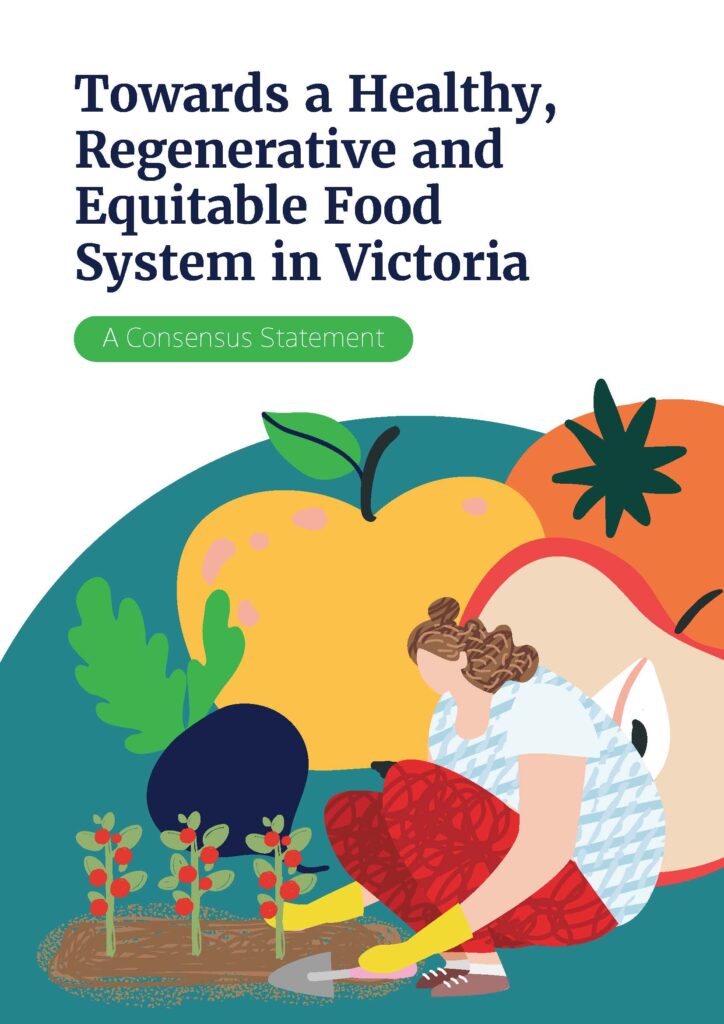
A Collective Reimagining of Victoria’s Food System
The Consensus Statement is grounded in evidence, global best practice and adopts a rights-based food systems approach. It proposes ten mutually reinforcing policy priorities, which call for action on key leverage points that the Victorian State and Local Government(s) and others should implement to catalyse the transition towards the healthy, regenerative and equitable food system needed. The breadth of cross-sector support for this Consensus Statement recognises the importance of this work.
Recognition of the need to transition food systems now dominates the thinking behind activities ranging from global food systems summits to local food production, processing, distribution and retail innovations. What this transition might look like is contested. Some stakeholders believe the solution to a broken food system involves a ‘productionist’ agenda characterised by increasing investment in technological innovations to create larger food production yields and more efficient food processing. Such developments can make an important contribution, though of themselves will not be sufficient to bring about the necessary transition to avert current threats of wide-scale ecological breakdown and endemic food insecurity. Increasingly, practitioners and researchers are identifying that the scale of the transition needs to extend beyond simple adjustments and nudges to different components of the food system. Instead, a fundamental transformation of the whole food system is required.

Mark Lawrence
Professor of Public Health Nutrition, Deakin University
Developing the Consensus Statement
1. Agree on a clear purpose and course of action
Recognising the need to prioritise action towards long-term food security and food equity, the Working
Group agreed to develop the Consensus Statement; a vision to strengthen and improve Victoria’s food
system and priority areas of action to inform Victorian State and Local government policy.
2. Generate a draft vision, guiding principles and priority areas for policy and action
All members of the Working Group put forward their vision for our food system and brainstormed
ideas for policy options. These were collated and condensed to generate a draft overarching
vision, guiding principles and priority areas for policy and action.
3. Achieve consensus
The draft of the overarching vision, guiding principles and priority areas for policy and action was
shared within the Working Group for discussion and feedback. Voting against the list of options
determined priorities with consideration to the 1.) Importance, potential impact, and cost-effectiveness; 2.) Potential for implementation to occur within a reasonable time period (2 to 5 years); and 3.) Relevant jurisdictional context and links to existing policy opportunities.
4. Refine content and wording
The content and wording of each priority area were refined, with expertise sought from outside the Working Group when appropriate.
5. Endorse Consensus Statement
Members sought endorsement from their respective organisations on the final version of the Consensus Statement.
6. Invite broader support
The Consensus Statement was circulated to stakeholders for further endorsement.
Victorian Food Security and Food Systems Working Group
The Victorian Food Security and Food Systems Working Group (the Working Group) was established in April 2020 under the auspices of the Victorian Health Promotion Foundation (VicHealth) to help coordinate the food relief response to the COVID-19 pandemic. The Working Group membership was drawn from across the food system and includes farmers, food relief organisations, social enterprises, academia, peak nutrition organisations and statutory bodies. After initially developing a plan to safeguard acute food security, the Working Group shifted attention to prioritising action towards ensuring long-term food security. The Consensus Statement is the outcome of that work.
Amber Bastian, Institute for Physical Activity and Nutrition (IPAN), Deakin University
Holly Beswick, VicHealth (April 2020 to June 2021)
Tracy Bialek, OzHarvest
Lisa Brassington, Cardinia Shire Council
Amy Brown, City of Greater Bendigo
Rachel Carey, University of Melbourne
Simone Carson, SecondBite
Melanie Chisholm, VicHealth (April 2020 to January 2021)
Kristine Cooney, VicHealth (September 2021 to present)
Kirsten Corben, VicHealth (April 2020 to May 2021)
Christine Couzens MP
Lisa Fitzgerald, Asylum Seeker Resource Centre
Tess Gardiner, The Community Grocer (November 2021 to present)
Marcus Godinho, Fareshare
Lucinda Hancock, Nutrition Australia – VIC, SA, TAS, WA
Tara Heneghan, VicHealth (January 2021 to May 2021)
Greg Jacobs, City of Melbourne
Dheepa Jeyapalan, VicHealth (September 2021 to present)
Matthew Kerlin, City of Greater Bendigo
Sue Kleve, Monash University
Kirsten Larsen, Open Food Network
Rebecca Lindberg, Institute for Physical Activity and Nutrition (IPAN), Deakin University
Sylvia Ly, VicHealth (April 2020 to June 2021)
Anna Mckinlay, Beechworth Health Service and Clare Schultz, Gateway Health – representing the North East Local Food Strategy Working Group
David McNamara, Foodbank Victoria
Jim Mullan, SecondBite
Veronica Nunez, VicHealth (September 2021 to present)
Jane Potter, VicHealth (September 2020 to May 2021)
Rob Rees, Cultivating Community and Moving Feast
Chanel Relf, City of Greater Bendigo
Nick Rose, Sustain
Russell Shields, The Community Grocer
Bernardo Tobias, OzHarvest
Linda Weatherson, City of Melbourne
Elisha West, OzHarvest
Ebony Yin, OzHarvest
We acknowledge the Traditional Custodians throughout Victoria, their enduring connections to land, sea, sky and community and pay our respects to Elders past and present. In the spirit of reconciliation, we affirm that the Traditional Custodians never ceded these lands and severe and enduring harm has ensued. We recognise the food sovereignty of Victoria’s First Nations peoples and their rights to self-determine their food systems and extend that recognition to all Aboriginal and Torres Strait Islander peoples today.
Victorian Food Security and Food Systems Working Group
© 2022-2023
Website Design – Foodways Consulting
Graphic Design – Bangarang Creative